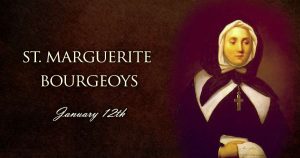HOMILY WEEKDAY 01 02 – Year I
Jesus: True God and True Man
Memorial of St. Marguerite Bourgeoys
(Heb 2:5-12; Ps 8; Mk 1:21-28)
*****************************************
Our Christian faith invites us to worship Jesus as divine, and relate to his humanity as a brother.
The author of Hebrews in yesterday’s first reading seemed very intent on establishing the identity of Jesus, utilizing such expressions as “Son of God, heir of all things, exact reflection of the Father’s glory and imprint of God’s very being, creator of the whole universe and superior to the angels.”
The same author, in today’s first reading, seems intent on just the opposite – establishing the humanity of Jesus, who was “made lower than the angels, suffered death, was the pioneer of salvation made perfect through suffering,” and who is “not ashamed to call us his brothers and sisters.”
Travelling through the rugged beauty of the mountains and canyons of Utah and Arizona on my holiday trip south one year became almost a pilgrimage, as in the morning I would do a travelling “holy hour” marvelling in awe at all this natural beauty created by Jesus “through whom all things were made.” It was not hard to see the divinity of Jesus is such beauty.
What helped me appreciate the humanity of Jesus was our recent pilgrimage to the Holy Land, visiting the sites where Jesus walked, lived, suffered and died to show us the depth of the Father’s love for us. To think that Jesus walked on this earth, in his humanity, solidified my appreciation of that humanity.
In the gospel, we see both dimensions of this mystery of the Incarnation in play. The townspeople were amazed that Jesus, one of theirs, who lived among them, who was so human and so ordinary, could do such wonders as heal a man with an unclean spirit.
 In this gospel, Mark is very much like the author of Hebrews yesterday, intent on proving the divinity of Jesus. Jesus first of all astounded the people by teaching with authority, unlike the scribes. The mode of teaching used by the rabbis and scribes was to make a point and substantiate that point by quoting other well-known sources. I have done my share of that myself, having spent time and effort trying to track down references for all the quotes I used in my latest book Still Green and Growing published by Novalis. Well, Jesus did none of that – he never quoted any other source because he was the source of all truth and wisdom – he simply spoke from his own inner authority in a way no other human being had done before.
In this gospel, Mark is very much like the author of Hebrews yesterday, intent on proving the divinity of Jesus. Jesus first of all astounded the people by teaching with authority, unlike the scribes. The mode of teaching used by the rabbis and scribes was to make a point and substantiate that point by quoting other well-known sources. I have done my share of that myself, having spent time and effort trying to track down references for all the quotes I used in my latest book Still Green and Growing published by Novalis. Well, Jesus did none of that – he never quoted any other source because he was the source of all truth and wisdom – he simply spoke from his own inner authority in a way no other human being had done before.
Actually, I have a little glimpse into what that is like, because my other book Drumming From Within, is all about my experience of ministering among the Indigenous peoples in the north, so I could just share my experience and had no need to quote anyone in that book. I guess I was able to write with a certain authority that could be seen as a pale reflection of the authority with which Jesus spoke and taught.
Jesus then healed the man troubled by demons, who identifies Jesus as the Holy One of God, thus reinforcing his claim to divinity. Jesus rebuked the evil spirits, and they obeyed, coming out of the man, showing his divine power over evil. So, between the first reading and the gospel, we see Jesus for who he is, true God and true man.
The psalm, borrowing a line from the gospel and an idea from the first reading, invites us to worship Jesus with the response, “You gave your Son authority over all creation.”
 Today the Church honors a woman of deep faith, St. Marguerite Bourgeoys. She is often referred to as the “Mother of the Colony” for her contributions to the establishment of Ville-Marie, the place we know today as Montreal. Born in France in 1620, Marguerite crossed the Atlantic in 1653 to join in the colonizing efforts begun by Monsieur de Maisonneuve. Her mandate was to develop educational opportunities for Indigenous children and for the families of the French settlers in Ville-Marie. Marguerite received the help of Jeanne Mance, founder of the Hôtel-Dieu Hospital. Other women joined her and the group formed an institute of uncloistered sisters, the Congregation of Notre-Dame. Marguerite and her companions took on many roles, including teaching, introducing vocational courses for youth and assisting couples preparing for marriage. She resisted Church pressure to change her community to a cloistered one and lived to see her order’s rule confirmed in 1698. Marguerite was well loved. She died in 1700 at the age of 80 and was declared a saint on October 31, 1982. In 1997, archaeologists uncovered the foundation of the chapel Marguerite built in Ville Marie 325 years earlier. Marguerite is a patron saint of poor people.
Today the Church honors a woman of deep faith, St. Marguerite Bourgeoys. She is often referred to as the “Mother of the Colony” for her contributions to the establishment of Ville-Marie, the place we know today as Montreal. Born in France in 1620, Marguerite crossed the Atlantic in 1653 to join in the colonizing efforts begun by Monsieur de Maisonneuve. Her mandate was to develop educational opportunities for Indigenous children and for the families of the French settlers in Ville-Marie. Marguerite received the help of Jeanne Mance, founder of the Hôtel-Dieu Hospital. Other women joined her and the group formed an institute of uncloistered sisters, the Congregation of Notre-Dame. Marguerite and her companions took on many roles, including teaching, introducing vocational courses for youth and assisting couples preparing for marriage. She resisted Church pressure to change her community to a cloistered one and lived to see her order’s rule confirmed in 1698. Marguerite was well loved. She died in 1700 at the age of 80 and was declared a saint on October 31, 1982. In 1997, archaeologists uncovered the foundation of the chapel Marguerite built in Ville Marie 325 years earlier. Marguerite is a patron saint of poor people.
Every Eucharist has two tables – that of the Word, and that of the Eucharist itself. Certainly, the table of the word today balances both the divinity and humanity of Jesus, and invites us to worship him as God. May our celebration strengthen our faith in Jesus as fully divine, and deepen our relationship with him as our brother.



